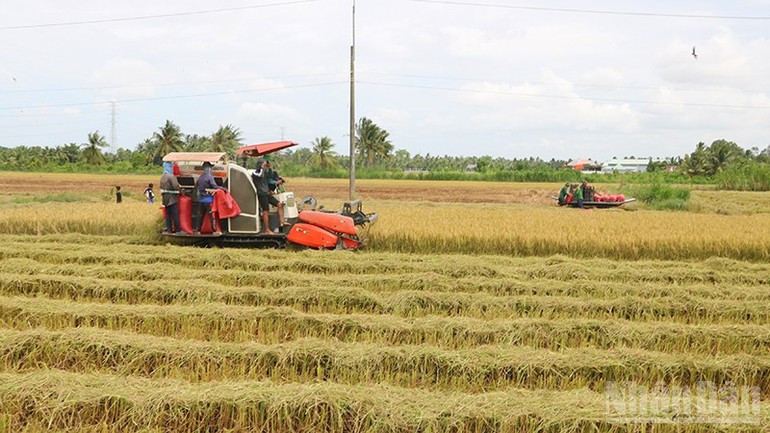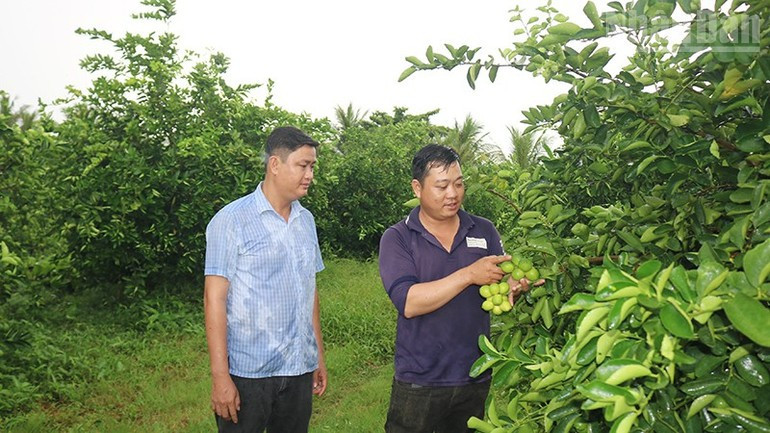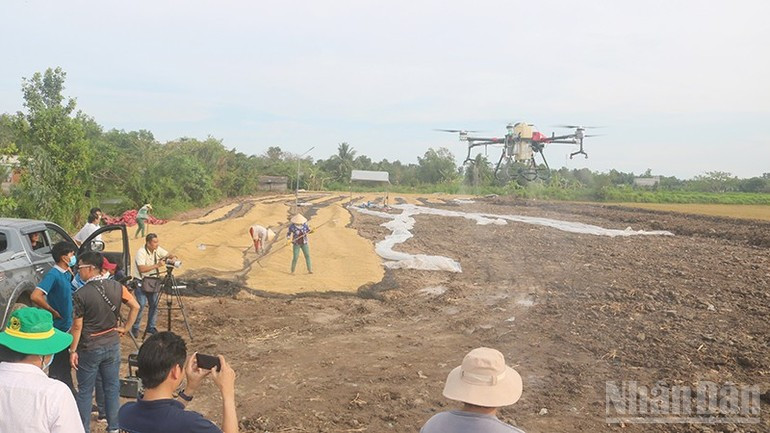Locality boosts green, clean, environmentally friendly agricultural production
In recent times, high-quality, low-emission rice cultivation models and seedless lemon farming for export to the European market in Vinh Long Province have contributed to building a green, clean, and environmentally friendly agricultural ecosystem, while also improving local livelihoods.
Low-emission rice farming model
As part of the project to develop one million hectares of specialised high-quality, low-emission rice cultivation aligned with green growth in the Mekong Delta by 2030, in 2024, the Phuoc Hao Agricultural Cooperative in Hung My Commune was selected by the Ministry of Agriculture and Environment to implement the low-emission rice cultivation model.
Phung Duy Truyen, Deputy Director of the Phuoc Hao Agricultural Cooperative, stated that the cooperative has implemented the model on 50 hectares with the participation of 46 members, using the ST24 rice variety with a growth cycle of 105 days. Members employed clump sowing techniques, using 60–70 kg of seed per hectare. This method allows rice plants to grow more openly, helping to reduce pests and diseases.
At the same time, the cooperative invested in a range of equipment for production, including rice dryers, combine harvesters, drone sprayers, rice milling machines, grain sorters, and clump seeders. These tools support the alternating wet and dry irrigation technique, helping to save water and reduce methane emissions.

As a result, over three rice crops — summer-autumn and autumn-winter 2024, and winter-spring 2024–2025 — the low-emission rice model has helped cooperative members reduce seed use by 60%, fertiliser use by 20%, and pesticide spraying by two times. Yields averaged 7–8 tonnes per hectare depending on the crop, with profits increasing by VND 6–10 million per hectare compared to non-model fields.
Nguyen Van Phuc, a member of the Phuoc Hao Agricultural Cooperative, shared his excitement that, during the winter-spring 2024–2025 crop, his family cultivated 2.5 hectares of ST24 rice following the low-emission production protocol, achieving a yield of 7.5 tonnes per hectare. The cooperative provided seed and fertiliser and secured a purchase contract at a price 1,200 VND per kg higher than the market rate.
For the 2025 summer-autumn crop, the cooperative has partnered with farmers in Hung My Commune to cultivate 200 hectares of low-emission rice. The cooperative guarantees product consumption for members and farmers practicing rice production in line with VietGAP standards.
According to the National Agricultural Extension Centre, pilot models of high-quality, low-emission rice farming in Vinh Long can be expanded and scaled up to develop a green, efficient, and climate-resilient agriculture. In 2025, communes and wards across the province have registered to cultivate 13,750 hectares of high-quality, low-emission rice.
Linking enterprises, cooperatives and farmers
In October 2022, the Thanh Chi Agricultural Cooperative in Tan An Commune was established, attracting 10 members and a charter capital of 500 million VND, with 3.6 hectares of seedless lemons cultivated for both domestic consumption and export.

According to Phan Duc Tai, Director of the Thanh Chi Agricultural Cooperative, after three years of operation, the cooperative has expanded its collaboration with 102 farmers in the communes of Cang Long, Tieu Can, Chau Thanh, and Tra Cu to cultivate 150 hectares of seedless lemons for export. Of this, 100 hectares are already producing stable yields of 30–35 tonnes per hectare, while the rest are beginning to flower and fruit.
Each month, the cooperative purchases dozens of tonnes of seedless lemons from its members and affiliated farmers to supply The Fruit Republic Company in Can Tho City for direct export to the European market. By 2030, the cooperative aims to collaborate with local communes and wards to establish a 400-hectare seedless lemon production zone, register planting area codes, and export agricultural products to Europe, the Middle East, New Zealand, and the Republic of Korea.
To accelerate the restructuring of agricultural production and adapt to climate change, the Export Seedless Lemon Occupational Association of Song Loc Commune has been established, attracting 29 members and covering 20 hectares. The members are also affiliated with the Thanh Chi Agricultural Cooperative and benefit from guaranteed product consumption.
After three years of converting 0.5 hectares of low-efficiency rice land to seedless lemons, Luu Van Tai now harvests over 1.5 tonnes of lemons each month. The Thanh Chi Agricultural Cooperative buys the lemons at prices ranging from 18,000 VND –25,000 VND per kg. As a result, his family enjoys a stable income of 200 million VND per year.
Thanks to proper technical practices — from seed selection, flower handling, and fruiting to disease prevention guided by technicians from The Fruit Republic Company — most of the lemon-growing area managed by the Export Seedless Lemon Occupational Association of Song Loc Commune meets VietGAP and GlobalGAP standards and satisfies export market demands.

Dr Le Van Dong, Deputy Director of the Department of Agriculture and Environment of Vinh Long Province, said that the implementation of Resolution No. 08-NQ/TU (dated January 23, 2017) by the Provincial Party Committee (formerly Tra Vinh) has led to strong transformations in cultivation techniques and production organisation, thanks to the adoption of organic, VietGAP, and GlobalGAP standards. Therefore, the province’s agriculture sector has promoted and encouraged communes, wards, and farmers to expand green, clean, and environmentally friendly production models, thereby protecting public health and improving livelihoods.








